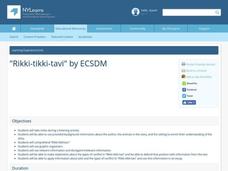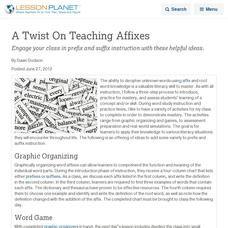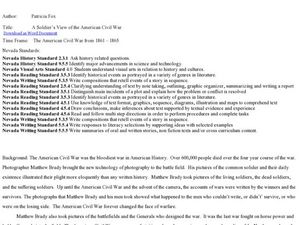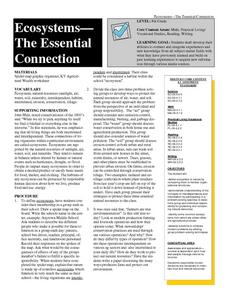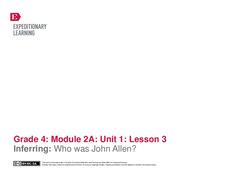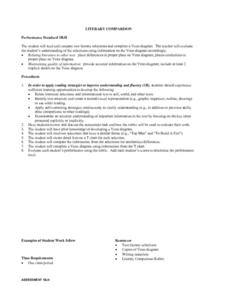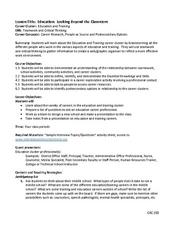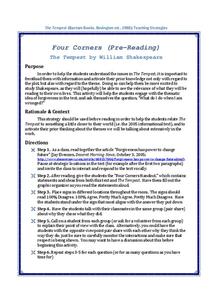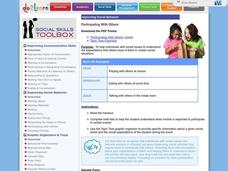Curated OER
"Rikki-tikki-tavi"
“Rikki-tikki-tavi” provides an opportunity to model for readers how to use background information to enrich understanding of a story. Class members observe animal behavior, listen to biographical background on Rudyard Kipling, study...
Curated OER
Nonfiction Genre Mini-Unit: Persuasive Writing
Should primary graders have their own computers? Should animals be kept in captivity? Young writers learn how to develop and support a claim in this short unit on persuasive writing.
Curated OER
A Twist On Teaching Affixes
Engaging your class in prefix and suffix instruction with these helpful ideas.
Curated OER
Comprehension: Identify Cause and Effect Relationships in Text
Third graders and their teacher work together to understand cause and effect relationships in texts. The I do, we do, you do method is used as learners discuss and determine the cause and effect relationships found in several short...
Historica-Dominion Institute
Artifact Creation Activity
Creating an artifact that is representative of a specific time period provides an opportunity for amateur historians to understand the importance of primary sources. This resource describes the process for students to explore original or...
EduGAINs
Go H2O! Investigating Residential Water Systems
Before your learners excuse themselves to get a drink at the water fountain, prompt them to think about where that water comes from. A middle school science instructional activity encourages groups to research their community's source of...
Curated OER
Understanding Core Values Using the Frayer Model
Students complete the Frayer Model. In this literature instructional activity, students review the concept of theme in literature. Students identify major themes in books they've read. Students learn the attributes of the Frayer Model...
Curated OER
Survival Extravaganza
Fifth graders discuss the effects of scarcity. In this survival lesson, 5th graders use strategies that would help them survive in a survival situation. Students write letters about bears in need of help to survive. Students answer...
Curated OER
A Soldier's View of the American Civil War
Study and research the American Civil War in this explanatory writing lesson. Middle schoolers complete six activities to learn about the American Civil War and soldiers' views of the war. The lesson includes several options to complete...
Curated OER
Ecosystems-The Essential Connection
Students develop their abilities to solve problems both in school and in a variety of situations similar to that they have encountered in life. They define the term ecosystem in nature by comparing them to familiar organizational...
EduGAINs
Data Management
Using a carousel activity, class members gain an understanding of the idea of inferences by using pictures then connecting them to mathematics. Groups discuss their individual problems prior to sharing them with the entire class....
EngageNY
Inferring: Who was John Allen?
Help your learners work with difficult or archaic words. A continuation of lesson two of this module, the plan here focuses on deciphering the Inventory of John Allen, in particular the unfamiliar words that make up much of the list. Add...
Curated OER
Writing Newsletters!
A reading of Gail Gibbons’ Deadline! leads to a discussion of the differences between newspapers and newsletters. Class members then choose a favorite topic and create the front page for their own newsletter.
Curated OER
Literary Comparison
Compare and contrast two pieces of literature with this instructional activity. With the use of a Venn diagram, pupils make connections between literature and real-life situations. They practice skills of surveying a text looking for...
Curated OER
What is a Fable?
Students read a variety of electronic Aesop's fables to define fable and moral, and write and illustrate an original fable. They then publish their fable using PowerPoint.
Curated OER
Elements of a Short Story (SMART Board)
Seventh graders view a PowerPoint presentation about short story elements. They complete a plot diagram using a previously read short story. Students brainstorm events in the story. They discuss the difference between major and less...
Curated OER
My Habitat
Students explore the environment they live in. In this habitats instructional activity, students define habitat and create a web in kidspiration. Students take a walk outside and record what they see and hear and may take pictures as...
Curated OER
I Just Drank George Washington's Water!
Guide your learners through the water cycle with this lesson plan. Over the course of the lesson, they read two Magic School Bus books, discuss the water cycle, come up with water facts, complete a diagram of the water cycle, recognize...
Curated OER
Education: Looking Beyond the Classroom
To better understand what it takes to work in the field of training or educating, learners first explore the education career cluster. After they research the cluster, pupils write questions for a guest speaker. This speaker can be from...
Bantam Books
The Tempest: Four Corners
Forgiveness can be a difficult step to take in any circumstance, but is it more difficult if the offense is more egregious? High schoolers consider the concept of forgiveness before reading William Shakespeare's The Tempest. As...
Virginia Department of Education
Creating Thesis Sentences
Growing writers explore what it takes to develop and support a thesis statement with pre-fabricated ideas provided by the Virginia Department of Education. Learners take notes on what makes a thesis statement and a topic sentence, and...
Do2Learn
Participating With Others
For learners with autism spectrum disorder, participating with others in a social setting can be stressful and overwhelming. A brainstorming activity prompts pupils to consider the expectations of a particular social occasion, including...
Do2Learn
Trying New Things
Preparing for a change, big or small, can help learners with autism cope with a potential stressor. A short activity prompts individuals to come up with a plan for an upcoming new experience.
Do2Learn
Tone of Voice and Volume Control
What level of voice is most appropriate for the classroom? Develop volume control in your learners with ASD with an activity that lets them know when they are using appropriate and inappropriate voice level.
